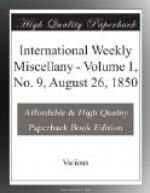may attribute this to his want of the stimulus which
the necessity of writing for a livelihood imparts,
and in part they may be right; but this is not the
whole secret. That his isolation from the stirring
contact of competition, that his utter disregard of
contemporary events, allowed his mind, which for perfect
health’s sake requires constantly-renewed impulses
from without, to subside into comparative hebetude,
there can be no doubt whatever. But the main
secret of the freezing up of his fountain of poetical
inspiration, we really take to have been his change
of politics. Wordsworth’s muse was essentially
liberal—one may say, Jacobinical.
That he was unconscious of any sordid motive for his
change, we sincerely believe; but as certainly his
conforming was the result less of reasonable conviction
than of willfulness. It was by a determined effort
of his will that he brought himself, to believe in
the Church-and-State notions which he latterly promulgated.
Hence the want of definite views, and of a living
interest, which characterizes all his writings subsequent
to that change, when compared with those of an earlier
time. It was Wordsworth’s wayward fate to
be patronized and puffed into notice by the champions
of old abuses, by the advocates of the pedantry of
Oxford, and by the maintainers of the despotism not
even of Pitt but of Castlereagh. It is already
felt, however, that the poet whom these men were mainly
instrumental in bringing into notice, will live in
men’s memories by exactly those of his writings
most powerful to undermine and overthrow their dull
and faded bigotries. Despite his own efforts,
Wordsworth (as has been said of Napoleon) is the child
and champion of Jacobinism. Though clothed in
ecclesiastical formulas, his religion is little more
than the simple worship of nature; his noblest moral
flights are struggles to emancipate himself from conventional
usage; and the strong ground of his thoughts, as of
his style, is nature stripped of the gauds with which
the pupils of courts and circles would bedeck and
be-ribbon it. Even in the ranks of our opponents
Wordsworth has been laboring in our behalf.
It is in the record of his extra-academic life that
the poet soars his freest flight, in passages where
we have a very echo of the emotions of an emancipated
worshiper of nature flying back to his loved resorts.
Apart from its poetic value, the book is a graphical
and interesting portraiture of the struggles of an
ingenuous and impetuous mind to arrive at a clear
insight into its own interior constitution and external
relations, and to secure the composure of self-knowledge
and of equally adjusted aspirations. As a poem
it is likely to lay fast and enduring hold on pure
and aspiring intellects, and to strengthen the claim
of Wordsworth to endure with his land’s language.
* * * *
*
THE MONUMENT TO SIR ROBERT PEEL.




